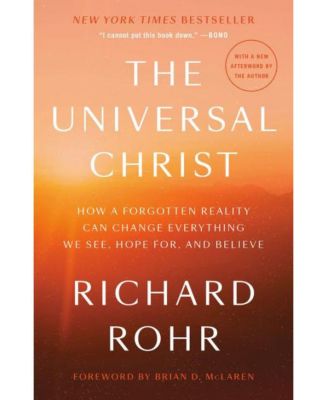The Universal Christ- How a Forgotten Reality Can Change Everything We See, Hope For, and Believe by Richard Rohr
Product details
Web ID: 16835691Insightful book! Great read!!
I have read several books on Christianity but not one like this. Rohr takes a much different approach and unpacks different concepts and perceptions about different stories from the Bible and how they can be viewed in a different manner. He tries to include context and storytelling to help illustrate his points and no matter what your religion or your background is, there iS something in here for you that you will resonate with or go "hmmm" about. Highly recommend to anyone! Great overall read and this will not be the last of Rohr's books that I will explore!!
Recommends this product

Customer review from barnesandnoble.com
Superb distillation of scriptures
This 2019 book in only 239 pages delivers on its challenging title. The author is a Franciscan priest who founded Albuquerque’s Center for Action and Contemplation. He has written many articles and books; this is my favorite. Rohr relies upon several scriptures in arguing that the “Christ Mystery” is the indwelling of the Divine Presence in everyone and everything since the beginning of time. (Page 13 of book). The Prologue to the Gospel of John (chapter 1) states that Logos was with God in the beginning, all things came into being through him, and that Logos later became flesh and dwelt among us (36). When put together, Jesus and Christ give us a God who is both personal and universal (30). One who creates the world including all people would naturally love all that He created. Christ is a good metaphor for absolute wholeness, complete incarnation, and the integrity of creation. Jesus, as a human just like us (Hebrews 4:15), showed us what the Full Human might look like if we could fully live (Eph. 4: 12-16). (Page 33). Love of neighbor as oneself is the second great commandment of Jesus. Yet, it is omitted from the Apostle’s Creed adopted with pressure from the Roman government. Rohr looks at the Great Comma in the Creed that serves to skip from birth of Jesus to his suffering under Pontius Pilate. Rohr asks about all the things Jesus said and did in those gap years. Were they nothing to believe in? Does the gap in some way explain Christianity’s often dismal record of imitating Jesus’s actual life and teaching? (106). This book argues that an emphasis on Jesus’ death makes salvation a one-time transactional affair instead of an ongoing transformational lesson for the human soul and all of history. The theory of substitutionally atonement causes us to “thank” Jesus instead of honestly imitating him. If we try to imitate him and thus seek changes in our minds and hearts, transformation thinking will supplant transactional thinking. (139-140). In that regard, Jesus left us a Helper. Jesus told his disciples that he had to depart so His Comforter could come to them (John 16:7). The love of God has been poured into our hearts by the Holy Spirit (Romans 5:5 and throughout the Bible). This personal, moral compass can guide us and is available to everyone. (193).
Recommends this product

Customer review from barnesandnoble.com

